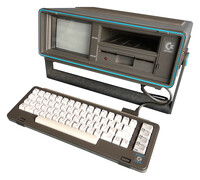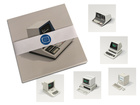Commodore SX-64 (240V UK)
| Home > Browse Our Collection > Computers > Commodore > Commodore SX-64 (240V UK) |
|
The Commodore SX-64, also known as the Executive 64, or VIP-64 in Europe, was a portable, briefcase/suitcase-size "luggable" version of the popular Commodore 64 home computer and holds the distinction of being the first full-colour portable computer. The SX-64 featured a built-in five-inch composite monitor and a built-in 1541 floppy drive. It weighed 23 lb (10.5 kg). The machine was carried by its sturdy handle, which doubled as an adjustable stand. It was announced in January 1983 and released a year later, at $995. Aside from its built-in features and different form factor, there were several other subtle differences between the SX-64 and the regular C64. The default screen colour was changed to blue text on a white background for improved readability on the smaller screen. This sometimes caused compatibility problems with programs that assumed the C64's default blue background. (This was, however, often easily overcome by the user simply entering the appropriate BASIC POKE commands to change screen colours and keystroke to change the cursor colour to mimic the C64's default colours prior to loading of the program.) The default device for load and save operations was changed to the floppy drive. In addition, the cassette port and RF port were omitted from the SX-64 because it had a built-in disk drive and monitor, and thus no need for a tape drive or television connector. However, the omission made it impossible to use a standard C64 Centronics parallel printer interface without modification, since these interfaces used a connector on the cassette port to get +5V for operation. There were also subtle differences in the cartridge port, both electrically and in regards to its physical placement on the board, which made compatibility with certain C64 cartridges spotty. Manufacturer: Commodore Comment on This Page Other Systems Related To Commodore SX-64 (240V UK):This exhibit has a reference ID of CH68571. Please quote this reference ID in any communication with the Centre for Computing History. |
|
























